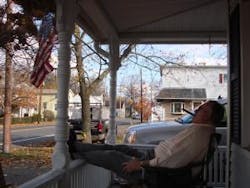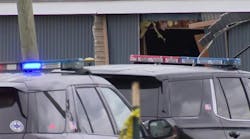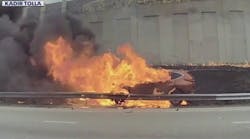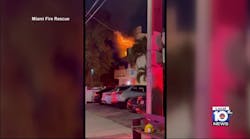How many of you have ever ridden in the right front seat on one of your fire department engines, trucks, or rescue units? I am going to guess that a great many of you have. Let me suggest to you that there is a lot more responsibility in taking that position that merely being responsible for sounding the siren or blowing the air horn.
When you take that position you assume the role of officer for that unit. Whether you are a senior member or not, that is the role you will be called upon to play. Whether you are an officer or not is of no consequence. You must step up to the plate and take a swing at doing the right thing.
I am worried my friends that far too many people are doing things for which they are either marginally qualified, or worse yet, totally unprepared. Let me share a story with you. I believe that it will tell you where I am headed in this visit with you.
Many years ago at the Fire Department Instructor’s Conference in Indianapolis, a bunch of the boys and I were holding court in a local watering hole. We got into a rather intense discussion of the state of affairs in our fire service.
A central topic in our debate involved what my buddies and I thought about the manner in which many younger firefighters and officers were conducting themselves. We felt that many of them simply did not seem to know and be aware of what we aging veterans took as gospel.
All of us who initially became engaged in this discussion were all on the far side of age 50. Each of us had been in the fire service at least since Lyndon Johnson was President. Further, there were those in the group who harked back to both the Kennedy and Eisenhower years. I mention this to you in order to provide a perspective on background for the discussion.
We were comparing notes on the problems inherent in the delivery of fire protection and EMS. As with all long-serving fire officers, opinions were available on any topic that came up for discussion. At some point during the evening’s festivities, an interesting counterpoint was noted. All of the folks on the south side of the table were 30 years of age or younger.
Each of us began to notice quizzical looks on the faces of the younger firefighters when the topic of conversation turned to the late Lloyd Layman, the late John T. O’Hagan, and the late Abbott and Costello. While each of us on the north side of age 50 nodded knowingly about the wisdom imparted by Layman and O’Hagan, our younger associates puzzled over which stone-age characters we were discussing.
The part that shocked me was that none of these younger troops knew who Abbott and Costello were. (For you younger types, they were a burlesque comedy team who achieved a certain amount of Hollywood and television fame in the 1940’s and 1950’s for their zany antics: such as the “Who is on First” routine, seen on late-night and early AM television.)
As the evening wore on, we older lads took great pains to share our collective wisdom with the younger troops at the table. It then occurred to us that we had just identified one of the primary problems at work throughout the fire service. We older troops simply take for granted that the younger people will automatically know what we are talking about. The corollary to this is that on the fireground, we expect our newer troops to automatically act and perform like we veterans do.
Now you may be saying to yourselves, Harry is telling us nothing especially brilliant here. But that is just the point. Some of our greatest problems in the fire service come from the fact that we take too much for granted. After more than 47 years in the fire and emergency services world, a great deal of what I do is ingrained in my psyche and my soul. I act or react based upon a body of knowledge accumulated over a long period of time.
For many years now a number of my buddies and I have been discussing the problems with the ways in which knowledge is shared with our younger fire people. This has all occurred in the intervening years since that fateful FDIC interaction. We have noted a tendency in many places not to pass along relevant personal knowledge and experience to younger people who may not have any first hand experience on a particular topic.
Truth be told, each of my buddies and I were wondering whether it was just our observation, or whether this view was more widely held in the fire service. Many times you and I learn things as we do them. Of course we should try to read the textbooks and attend the classes, but more often then not it is the way in which we apply this knowledge that helps us to make it a part of our operational psyche.
Perhaps one of the best examples I can offer comes from the world of fire apparatus pump operations. Like many of you, I have attended the schools and the drill classes. In addition I have read the right books. However, it takes a human instructor, combined with hard experience to hone in on the topic.
In my case, two people stand out for their efforts in shaping my skill as a pump operator. The first was a gentleman named Mr. Martin. He was one of my block two instructors at the U.S. Air Force Firefighting School, which was in those days located at Chanute Air Force Base in Rantoul, Illinois. He was a patient man who knew the job of a pump operator from the inside out.
You did not pass out of his course without being able to demonstrate that you could pump the two models of U.S.A.F. pumper apparatus at the school: the 750A and the 530B. Thanks to his efforts, I arrived at my first duty station in Alaska with a good rudimentary set of skills. These skills were honed over time by continuing practice under the watchful eyes of veteran driver/operators.
The second person who stands out in my memory is the late Herb Foster. Herbie was the driver on Engine Company # 11 when I arrived there as a rookie back in 1973. His advice was really quite simple and he lived his advice at every fire we attended. He would say to me, "Kid, your job is to get water for our company. Once you get it for us, if you can help another company, do it. But never steal the water from your own guys."
So it was that I learned to operate a pumper more than 40 years ago. Through a combination of learning and doing under the watchful eyes of someone who knew how to do the job really well. It took a lot of years before I was ever allowed to take the right front seat in anyone's fire truck.
These days we call this type of human interaction mentoring. In a mentoring relationship, an organizational veteran is paired with a new member of the organization in such a way that the experience and wisdom of the veteran is passed on to the younger individual. Sadly, there are far too many organizations who fail to do any kind of mentoring.
I can recall the first time I was called upon to ride the right front seat on Engine Company #11 in Newark. In those days you had to have three years' experience before being allowed to act as the Captain of a company. In my case, I had experience which few of my fellow Newark buddies had. During my time in the U.S. Air Force Fire Service I had served as both a crew chief and a relief station captain. Many had been the times when I had to make the hard decisions which commanding a fire department unit. So I felt I was ready.
Let me tell you one thing. It was not easy to go from the back step to the right-front seat. When you are one of the gang, you can lay back and wait for the boss to give you your orders. When you are up front calling the shots, it is really quite a different story. It probably took me a few turns in the acting world to begin to get my bearings. I learned fairly quickly that it takes time to learn how to ride the right front seat and do a good job.
Let me suggest to you that there are many younger people reaching the officer's ranks who have never had the benefit of being mentored. More than that, we are not seeing the workload that was once prevalent in our fire departments. Many of these younger folks lack the knowledge which can only be gained in a one-on-one sharing experience with a veteran fire officer.
As a matter of fact, a dear friend of mine did her doctoral dissertation on the concept of tacit knowledge in a government agency. Her findings were part of the reason for my work on this project. She discovered that a great deal of the knowledge which is contained within the brains of the organizational members is never passed along to others.
Another discovery was that the ways in which people want to receive their knowledge varies from generation to generation. Younger people want to learn, but they want to learn in a way that is comfortable for them and their contemporaries. I learned a great deal of this from my daughter Kathleen who serves with me in the Adelphia Fire Company.
Far too much knowledge is being lost because there are those in positions of leadership and longevity who have simply decided not to share what they know. They have adopted a posture of selfishness. "I learned it myself, and so will those young whipper-snappers." Believe me when I tell you that I have seen this on more than one occasion.
This is what my buddies and I have pledged to work at changing. For some of you, the transition from riding backwards and taking orders to that of riding the right front seat and being expected to give order is sudden, and comes without a great deal of preparation. In my case, it was a simple as going from the back step of Engine Company #11 to the right front seat of Engine Company #18 after a short promotional ceremony. Thankfully, as I said earlier, I had served time as a crew chief in the Air Force and had been brought to that position over time; after a period of training and mentoring. Others were not as fortunate.
For some of you, reaching the right front seat comes only after an intensive period of studying and a thorough testing process. For others of you out across North America, the process comes more quickly and involves nothing more than winning an election in your local fire department.
What I am suggesting to you is that you seek out a veteran in your department to help you prepare for the transition. Approach them and ask them up front to help you by sharing what they have learned over the course of their years on the fire department. To you veterans, I am suggesting that you owe a duty to the succeeding generations of your fire department to share what you know.
This will work best if it becomes an institutionalized part of how your department works. However, if it must be informal, so be it. If you are a veteran member, shared what your years have taught you. If you are a younger member, seek the help of a respected senior member of your organization.
All of us will end up in the right front seat eventually. Whether you are an officer, or just one of the gang riding up front, recognize the importance of this role and devote yourself to preparing for the job. Be serious because people's lives will depend on how well you do your job. Take care and stay safe. .






